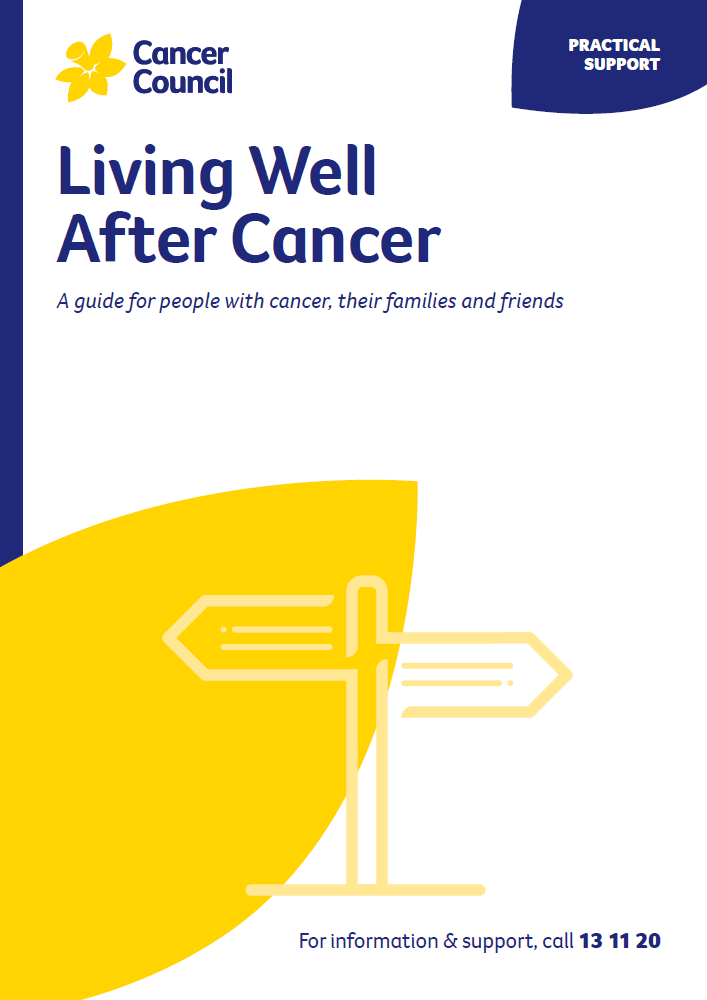- Home
- About Cancer
- Living well
- Living well after cancer
- Looking after yourself
- Drink less alcohol
Drink less alcohol
Drinking alcohol increases the risk of developing some cancers, including cancer of the mouth and throat, oesophagus, bowel, stomach, liver and breast. Even drinking small amounts of alcohol can increase cancer risk, and the risk increases with every drink. Alcohol contains a lot of energy (kilojoules or calories), so it can contribute to weight gain. Drinking alcohol also increases the risk of other diseases, such as heart disease and type 2 diabetes.
Cancer Council recommends you limit how much you drink to reduce your cancer risk. If you choose to drink alcohol, stick to the National Health and Medical Research Council guidelines and have no more than 10 standard drinks a week and no more than 4 standard drinks in one day. One standard drink has 10 grams of alcohol, but remember that drinks served at home and bars are often more than a standard drink.
Ways to reduce your alcohol intake
- Choose a non-alcoholic drink such as sparkling mineral water with fresh lemon or lime slices.
- Alternate alcoholic drinks with a glass of water.
- Set yourself a limit and stop once you’ve reached it.
- Wait until your glass is empty before topping it up to keep count of your drinks.
- Explore no alcohol beers, wines, spirits and mocktails.
- Have some alcohol-free days each week.
- Eat while you drink to slow your drinking pace.
- Catch up with friends over coffee or go for a walk.
- Download the Daybreak app to help monitor your drinking.
For information and support, call the National Alcohol and Other Drug Hotline on 1800 250 015.
Podcast for people living with cancer
Listen now
More resources
Prof Michael Jefford, Medical Oncologist and Director, Australian Cancer Survivorship Centre, Peter MacCallum Cancer Centre, VIC (clinical review); Lucy Bailey, Nurse Counsellor, Cancer Council Queensland; Philip Bullas, Consumer; Dr Kate Gunn, Clinical Psychologist and Senior Research Fellow, Department of Rural Health, University of South Australia, SA; Rosemerry Hodgkin, 13 11 20 Consultant, Cancer Council WA; Prof David Joske, Clinical Haematologist, Sir Charles Gairdner Hospital and Clinical Professor of Medicine, The University of Western Australia, WA; Kim Kerin-Ayres, Clinical Nurse Consultant, Cancer Survivorship, Concord Hospital, NSW; Sally Littlewood, Physiotherapist, Seymour Health, VIC; Georgina Lohse, Social Worker, GV Health, VIC; Melanie Moore, Exercise Physiologist and Clinical Supervisor, University of Canberra Cancer Wellness Clinic, ACT; June Savva, Senior Clinician Dietitian, Nutrition and Dietetics, Monash Cancer Centre, Monash Health, VIC; Dr Elysia Thornton-Benko, Specialist General Practitioner and Research Fellow, University of New South Wales, NSW; Prof Janette Vardy, Medical Oncologist, Concord Cancer Centre and Professor of Cancer Medicine, The University of Sydney, NSW; Lyndell Wills, Consumer.
View the Cancer Council NSW editorial policy.
View all publications or call 13 11 20 for free printed copies.

